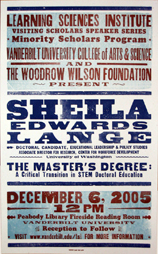Keivan G. Stassun
Stevenson Professor
Physics & Astronomy
Vanderbilt University
Teaching

The Life and Death of Stars video course now available on DVD or online.
Courses
I teach
the following courses, which are open to both Vanderbilt and Fisk students:
- Astronomy
102: Stars,
Galaxies, and Cosmology [3]
This is a general introductory astronomy course intended primarily for non-science majors. This course explores the Universe with a focus on the physical processes that have led to the evolution of life on Earth. A separate course (Astro 201) focuses on the solar system in detail. Students interested in a more rigorous, math- and physics-based introdution to astrophysics are encouraged to take Astro 205. - Astronomy
3000 (formerly ASTR 205): Principles
of Astrophysics [3]
This is an introductory astrophysics course intended for physics majors (especially those on the astronomy/astrophysics track), astronomy minors, other science and engineering majors, or any student interested in a rigorous, math- and physics-based introduction to astronomy. Prerequisites are one semester each of college-level physics and calculus. Students who do not meet these prerequisites are encouraged to take Astro 102. - Astronomy
222/322: Observational
Astronomy Laboratory [3]
This is a hands-on astronomy laboratory course for physics majors (especially those on the astronomy/astrophysics track), astronomy minors, other science and engineering majors, or any student interested in doing real astronomy experiments. The course meets at the Dyer Observatory one evening per week from 6-11pm. An emphasis is placed on experimental design, data collection methods, data analysis (including some computer programming), error analysis, and statistical methods. Prerequisites are one year each of college-level physics and calculus. The graduate-level equivalent (322) includes an additional hour per week of introduction to statistical techniques for astronomers, and discussion of techniques for effectively presenting quantitative information. - Physics 302:
Learning
to Teach, Teaching to Learn [1]
This is a seminar course focusing on college teaching in the sciences. The course is primarily aimed at first-time teaching assistants, and other graduate students who are interested in improving their teaching skills. Through readings, the course provides an introduction to science education research, cognitive science, and education theory. Through group discussions, the course provides an opportunity for reflection on teaching techniques that promote learning in the classroom. Finally, the course provides an opportunity for development of a teaching portfolio, which is becoming increasingly important in the academic job market. - Educ 3900: Epistemology Foundations of Math and Science [3]
This course examines the social, cognitive, and material arrangements and mechanisms that contribute to how we know what we know in mathematics and in sciences. Knowing how we know is the domain of epistemology, and assembling the means to create disciplinary-distinct ways of knowing creates an "epistemic culture." It is this culture within a discipline that sustains and regulates core assumptions about knowing within that discipline. The focus on epistemology is intended as counterpoint to more traditional approaches to education, which take the content to be taught as fixed and the aim of pedagogy as being to develop effective methods (e.g., “best practices”) for delivery of this knowledge. This course focuses instead on considering what makes knowing challenging in these disciplines, because such a perspective offers alternative framings of the problem of teaching. Questions about teaching science—what should be taught, to whom, and when—are all potentially revised by considering carefully how we come to know. How well do current instructional designs help students understand the nature of knowing in sciences and in mathematics? How might alternative instructional designs be informed by analysis of forms of knowledge and ways of knowing (i.e., practices) in math and science?
Scholarship
of Teaching and Learning
In addition
to teaching the courses above, I also participate in activities that promote
scholarly teaching practices within the University community and that
promote professional development in teaching among graduate students:
- Center for Teaching workshops for faculty and graduate students
- GK-12 Teaching Fellows mentorship, outreach, and graduate student professional development
- Learning Sciences Institute education research

Poster for a
talk by Sheila Edwards Lange,
a Visiting
Minority Scholar with Vanderbilt's
Learning Sciences Institute, on the role of
the Masters degree in the PhD attainment
of underrepresented minorities.